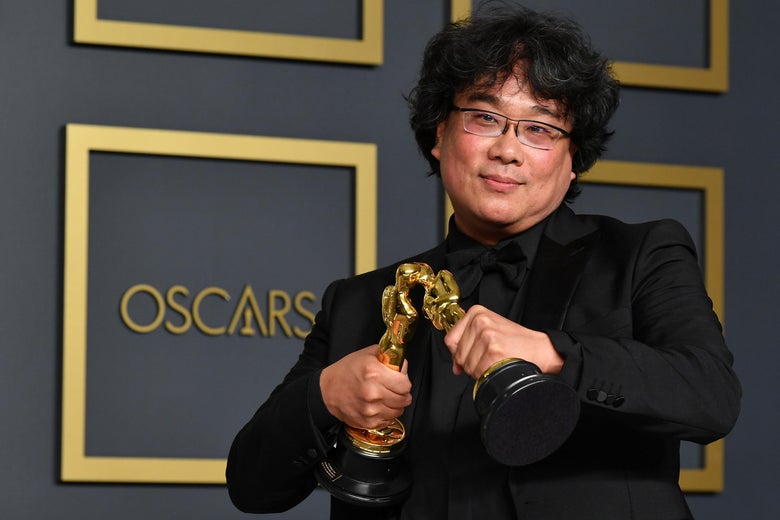The Parasite: Bong Joon Ho’s International Hit
March 6, 2020
To say that Bong Joon Ho’s The Parasite was a success is an understatement. Since its premiere in October of 2019, the South Korean thriller has received praise from all over the world, and has won numerous international (European and American) awards despite being a foreign film without an English dubbed version.
Although The Parasite has been a worldwide hit, it was not Bong’s first critically acclaimed film. Domestically, many of his films have been box office hits, like The Snowpiercer and The Host, both receiving the award for Best Film at the highly prestigious Korean Blue Dragon Film Awards. Outside of Korea, his 2017 film, Okja, was nominated for the Palme d’Or at the Cannes Film Festival, though it did not win. The Parasite’s most recent wins, however, have made history for Bong Joon Ho and the international film category.
In addition to nine major Asian awards, The Parasite won Best Foreign Language Film at the Golden Globes, bringing South Korea their first-ever win for the category. In his acceptance speech, Bong said, “Once you overcome the 1-inch-tall barrier of subtitles, you will be introduced to so many more amazing films,” addressing American xenophobia. Two weeks later, the cast won the Best Ensemble award at the Screen Actors Guild Awards. This international award was the first recognition of the cast, rather than the film or of Bong. This SAG award made history, as it was the first foreign film to ever win. Many thought that this would be the end of the success of The Parasite, but Bong Joon Ho was just getting started.
On January 13, the nominations for the 92nd Academy Awards were announced. There were many mixed reactions when people saw that The Parasite was nominated for not only the expected International Feature Film category, but also for Best Original Screenplay, Best Production Design, Best Film Editing, Best Directing, and the renowned Best Film category. Many were outraged that a non-English film would even be considered against The Joker or any film by Quentin Tarantino. Supporters of the nomination, however, felt that with the Oscars’ long history of racial disproportionality in award nominations, having an all-Asian film nominated was long overdue. Also noteworthy of this year’s nomination was the change in name of the “Best Foreign Language Film” to “Best International Feature Film”. This change was implemented to erase the association of the word “foreign” with unfamiliar or “other than”. Early in the evening, the film took home the Best International Feature Film award, as expected, but lost Best Production Design and Film Editing to Once Upon a Time in Hollywood and Ford v. Ferrari, respectively. Throughout the night, however, The Parasite managed to win Best Original Screenplay and Best Directing, a first for Korea in both categories. Each time Bong Joon Ho came to the stage, he began to give his basic “thank you” speech in English and then quickly switched back to his native language to give the rest, clapping back to those who had criticized the Korean film’s nomination. At the end of each of his speeches, he finished by saying, “I’m ready to drink tonight,” garnering laughs throughout the audience. Bong also made viewers laugh when he played with his Oscars, making them kiss.
As the ceremony came to an end, people were anxious to see who would take home the award for Best Film. The Parasite had tough competition, as it was nominated against films like Jojo Rabbit, The Joker, 1917, and Once Upon a Time in Hollywood. Despite backlash surrounding the film’s nomination, it ended up winning the category, making history. Not only was it the first South Korean film to ever win the Best Film Award, but it was the first-ever foreign-language film to win. Only ten other foreign films had ever been nominated in this category. When The Parasite team was called to the stage to accept their award, the overall shock in the room was obvious. Once the audience grasped that The Parasite had won, they instantly stood for an ovation. Two and a half minutes into the production team’s acceptance speech, a much shorter amount of time compared to winners in the past, the lights began to dim, the microphone was cut off, and the camera moved elsewhere. Most of the cast just shrugged their shoulders and were ready to leave the stage, but the audience was taken aback by this sudden cut from the winners and began to boo, motioning to turn the lights back up. Soon thereafter, the camera quickly cut back to the cast, allowing them to finish their speech.
While accepting his award, Bong spoke of being inspired by Martin Scorsese as a young film student, but now he, himself, has become a new generation’s icon, serving as a role model to aspiring filmmakers across the globe. His wins have shown that regardless of language, English or Korean, great cinema is universal with hard work and powerful ideas. Hopefully in the future, American films will see more competition with the possibility of more foreign films in the running for mainstream awards.


